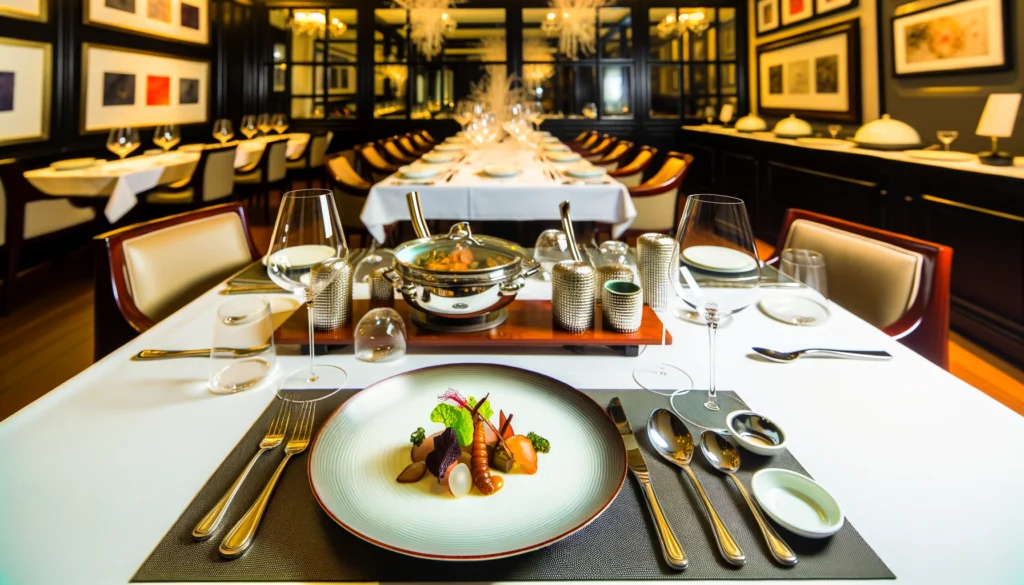
The Michelin Guide is a prestigious book of recommendations for hotels and restaurants, originally created by the Michelin tire company in 1900 to encourage more road travel, and thus, more tire purchases. Over the years, it has evolved into an authoritative guide that awards Michelin stars for excellence to a select group of establishments. The rating system ranges from one to three stars and is highly respected in the culinary world, with chefs aspiring to earn and maintain these coveted stars for their restaurants.
Try this lesson: Michelin Guide
Table of Contents
A2 Level Questions:
- What is the Michelin Guide?
- How many Michelin stars can a restaurant receive?
- Why do chefs want to get Michelin stars?
- Can hotels get Michelin stars too?
- How do you think restaurants get chosen for the Michelin Guide?
- Do you think Michelin stars are only for expensive restaurants?
- Would you like to eat in a Michelin-starred restaurant? Why?
- What kind of food do Michelin-starred restaurants serve?
- How do you think a restaurant feels when it gets a Michelin star?
- Are Michelin stars given to restaurants in every country?
B1 Level Questions:
- What criteria might the Michelin Guide use to rate restaurants?
- How does a Michelin star affect a restaurant’s business?
- Do you know any restaurants that have Michelin stars? What are they famous for?
- Why do you think the Michelin tire company started a guide for restaurants?
- Can a restaurant lose its Michelin star? Why or why not?
- How do you think the Michelin Guide inspectors decide which restaurants to visit?
- What’s the difference between a one-star, two-star, and three-star Michelin rating?
- Do you think the Michelin Guide has an impact on local cuisines? How?
- Would you trust the recommendation of the Michelin Guide? Why?
- How do chefs and restaurants prepare for a Michelin Guide inspection?
B2 Level Questions:
- Discuss the significance of the Michelin Guide in the culinary world.
- How has the Michelin Guide influenced global dining trends?
- What are the controversies or criticisms associated with the Michelin Guide?
- How does the Michelin Guide maintain its anonymity and impartiality?
- Can you think of any restaurants that have dramatically changed after receiving a Michelin star?
- How do cultural differences affect the Michelin Guide’s ratings in different countries?
- What role does innovation play in earning a Michelin star?
- How do Michelin-starred restaurants impact tourism in a region?
- Discuss the economic and social implications of a restaurant losing its Michelin star.
- How has the Michelin Guide adapted to changes in dining habits and sustainability concerns?
C1 Level Questions:
- Analyze the criteria used by the Michelin Guide for awarding stars and how they reflect culinary excellence.
- Discuss the impact of the Michelin Guide on a chef’s career and restaurant reputation.
- How do Michelin-starred restaurants balance tradition and innovation in their cuisine?
- Evaluate the influence of the Michelin Guide on global culinary standards and expectations.
- How has the Michelin Guide contributed to or influenced the concept of “gourmet” dining?
- Discuss the potential biases and limitations of the Michelin Guide’s selection process.
- How do restaurants prepare for an unexpected Michelin Guide inspection?
- What are the challenges faced by restaurants aiming to gain or retain Michelin stars?
- How does the Michelin Guide’s focus on fine dining affect the broader restaurant industry?
- Explore the role of sustainability and ethical considerations in the Michelin Guide’s evaluations.
C2 Level Questions:
- Critique the cultural and economic impact of the Michelin Guide on local dining ecosystems.
- How does the Michelin Guide negotiate the tension between culinary innovation and traditionalism?
- Discuss the Michelin Guide’s role in shaping national culinary identities and practices.
- Analyze the Michelin Guide’s influence on consumer perceptions of quality and luxury in dining.
- Explore the implications of the Michelin Guide’s expansion into new markets and cuisines.
- Debate the relevance of the Michelin Guide in the age of online reviews and social media.
- Examine the Michelin Guide’s approach to diversity and inclusion within the culinary world.
- Assess the impact of the Michelin Guide on chefs’ mental health and well-being.
- Discuss the future of the Michelin Guide in the context of changing global food trends.
- Analyze how the Michelin Guide has evolved in response to criticisms and challenges.
